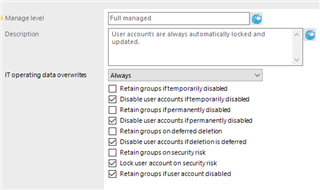Hello everyone,
in my lab with OIM 8.1.2, I have defined an Account Definition with:
"Retain account definition if permanently disabled" checked
"Retain account definition if temporarly disabled" checked
I defined a costum process with event DEACTIVATE-ADSAccount to send
emails to the employee's manager and other people when an employee
leaves the company or is temporarly disabled.
When an employee leaves the company, in OIM he becomes permanently deactivate
and its AD account is disabled but my process is not executed.
if the Account Definition has the properties:
"Retain account definition if permanently disabled" UNchecked
"Retain account definition if temporarly disabled" UNchecked
when an employee leaves the company, my process is executed.
I think this is a strange behaviour.
Giuseppe




